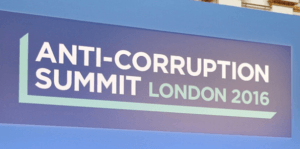Cost of corruption: The most affected, the poor, must speak out!
 The poor are the most affected everywhere there is corruption.
The poor are the most affected everywhere there is corruption.
Even though, Sociologists argue that corruption serves as an enabler for the poor, for instance, they are often not well connected and highly educated and therefore, the only way they are able to access public services like birth certificates, passports, healthcare and even security services from the police and others is by paying bribes – services they are entitled to as citizens, but can’t get if they didn’t pay bribes.
Statistics by the World Economic Forum and the World Bank show that $1.25 trillion dollars are paid in bribes annually and the loss of 5 per cent of global annual output – about $2.5 trillion – to corruption.
The International Monetary Fund (IMF), which also believes that corruption is one of the most important problems facing the world today and that addressing the phenomenon has become increasingly urgent.
The IMF also estimates that the annual cost of bribery alone is about $1.5 to $2 trillion (roughly 2 per cent of global GDP).
“The overall economic and social costs of corruption are likely to be even larger, since bribes constitute only one aspect of the possible forms of corruption,” it adds.
In a 2003 paper titled Corruption and Poverty: A review of recent literature by Chetwynd, E, et al, the authors argue that corruption in the public sector – the misuse of public office for private gain is often viewed as exacerbating conditions of poverty (low income, poor health and education status, vulnerability to shocks and other characteristics) in countries already struggling with the strains of economic growth and democratic transition.
“Alternatively, countries experiencing chronic poverty are seen as natural breeding grounds for systemic corruption due to social and income inequalities and perverse economic incentives,” they added.
The authors postulate that after reviewing the literature they came to the conclusion that corruption, by itself, does not produce poverty. Rather, corruption has direct consequences on economic and governance factors, intermediaries that in turn produce poverty.
In the lights of the recently released Panama Papers, and the Anti-Corruption Summit held in London, the reality of the effects of corruption has confronted the entire world. But the irony is, the ones leading the fight against corruption do have the powers to combat the practice, but then again they only seem to be talking rather than doing much. Moreover, from data deduced from the Panama Papers, which show how the rich and wealthy hide their wealth, the majority of individuals shown in the leaked papers are politicians! The same group of people we expect to exercise the powers conferred on them collectively to curb the menace.
The crux of the matter about the Papers is that, while some of the names revealed do not engage in illegal activities, some are using tax havens to avoid paying taxes!
“If governments continue with a piecemeal response, people across the world – including some of the world’s poorest people – will pay the price. Tax dodgers are cheating poor countries out of $170 billion in taxes every year. A fraction of this money could fund health services that could save the lives of almost 150 million children,” Oxfam said.
What the world needs to do to deal decisively with corruption is to show that there are credible threats of being tried when caught and jailed when found guilty. But that credible fear of the law, being efficiently and effectively used to fight corruption isn’t there. Most anti-corruption institutions are weak and under the thumbs of the political class, whose direction and orders the institutions require to operate. Law enforcement and judicial institutions are deliberately in some instances filled with friends and cronies, while they are expected to operate with weak laws that are hardly enforced.
It is not uncommon to find or hear political leaders speaking against corruption while to their left or right on the same platform are some of the most corrupt in their countries and governments. People who take food out of the mouth of the poor and send most poor people to their early death because funds that were meant for investment in generating economic activities that could have created some jobs and provided equipment and medicine for hospitals have been stolen by these individuals.
There are evidences of governments that claim to be fighting corruption and yet they are shielding their ministers and appointees from prosecution even in some specific incidences that state attorneys have recommended prosecution for clear acts of corruption in which the state has lost several million dollars in questionable deals that have benefitted these officials or their cronies and assigns.
The London summit would only be meaningful if a global institution in the fashion of the International Criminal Court (ICC), never mind its problems is established to deal with corrupt public officials whose acts of commission and omission continue to impoverish their hardworking citizens.
The poor, the majority, should also end their compliance with the ruling class whose engagement in corruption is deepening their needless poverty – the poor must speak up and say no to corruption. By speaking up, the poor would be sending a signal to the political class and their accomplices in business that they won’t acquiesce any more, and that could be the beginning of possibly a true people’s revolution to end corruption and lead to a redistribution of wealth.
By Emmanuel K. Dogbevi
Email: [email protected]
Copyright © 2016 by Creative Imaginations Publicity
All rights reserved. This article or any portion thereof may not be reproduced or used in any manner whatsoever without the express written permission of the publisher except for the use of brief quotations in reviews.
